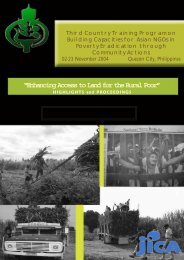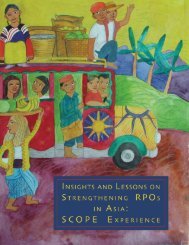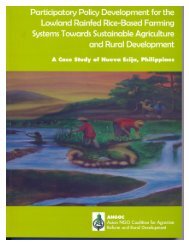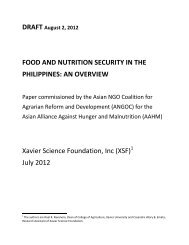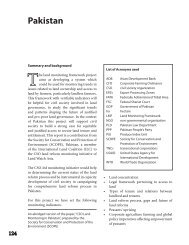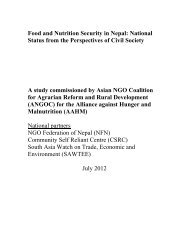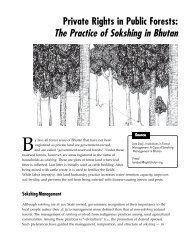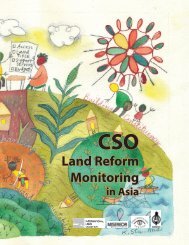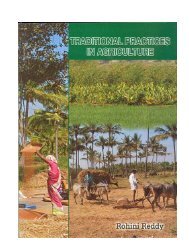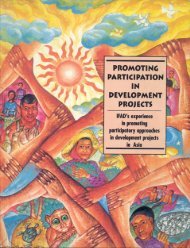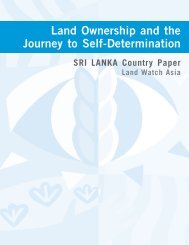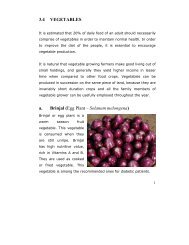Securing the Right to Land FULL - ANGOC
Securing the Right to Land FULL - ANGOC
Securing the Right to Land FULL - ANGOC
Create successful ePaper yourself
Turn your PDF publications into a flip-book with our unique Google optimized e-Paper software.
SECURING THE RIGHT TO LAND102<br />
based on approaches which are humanitarian, just and popular,<br />
and which respect national sovereignty. Agriculture occupies a<br />
vital position in <strong>the</strong>se policies. Hence, agriculture is no longer<br />
viewed as a subset of industry, producing food and <strong>the</strong> raw material<br />
for manufacturing, but as being closely intertwined with<br />
production and economics.<br />
In addition, <strong>the</strong> task of revitalizing agriculture requires that different<br />
governments work in tandem in formulating strategies<br />
and policies in relation <strong>to</strong> efforts <strong>to</strong> address poverty, unemployment,<br />
and economic growth.<br />
Three government departments are most closely involved in <strong>the</strong><br />
tasks set forth by <strong>the</strong> RPPK. These are <strong>the</strong> Department of Agriculture,<br />
<strong>the</strong> Department of Forestry, and <strong>the</strong> Department of<br />
Maritime Affairs and Fisheries, which are under <strong>the</strong> Coordinating<br />
Minister for Economic Affairs, Aburizal Bakrie. 2 These departments<br />
are crucial <strong>to</strong> <strong>the</strong> future of <strong>the</strong> agricultural sec<strong>to</strong>r<br />
because <strong>the</strong>y hold <strong>the</strong> governmental power and authority related<br />
<strong>to</strong> <strong>the</strong> use and management of agrarian resources (particularly<br />
agricultural and plantation lands, aquatic resources<br />
and forest areas) in Indonesia. Therefore, because <strong>the</strong>y are<br />
mandated by <strong>the</strong> RPPK <strong>to</strong> work <strong>to</strong>ge<strong>the</strong>r, it is hoped that better<br />
coordination among <strong>the</strong>se agencies, which <strong>to</strong> this point has<br />
been very weak, would result in <strong>the</strong> improvement of <strong>the</strong> livelihoods<br />
of farmers, in particular, and of <strong>the</strong> agricultural sec<strong>to</strong>r, in<br />
general. As such, <strong>the</strong> RPPK could prove <strong>to</strong> be an important <strong>to</strong>ol<br />
for moving forward more fundamental reforms in <strong>the</strong> agrarian<br />
sec<strong>to</strong>r, especially since such reforms require a unified approach<br />
among <strong>the</strong> various state agencies working in <strong>the</strong> sec<strong>to</strong>r.<br />
If Indonesia genuinely seeks <strong>to</strong> reform <strong>the</strong> weaknesses in its<br />
agrarian structures and revitalize agriculture, <strong>the</strong>n state institutions<br />
which work in <strong>the</strong> field must have a common perspective<br />
of farmers and farming. The various departments which bear on<br />
farmers’ livelhoods and agriculture must first be reformed, and<br />
coordination among <strong>the</strong>m improved, <strong>to</strong> form a strong basis for<br />
<strong>the</strong> implementation of agrarian reform and <strong>the</strong> RPPK initiative.<br />
Challenges<br />
Overlapping Responsibilities among Government<br />
Agencies<br />
The challenge will come from <strong>the</strong> tendency of state institutions<br />
<strong>to</strong> protect <strong>the</strong>ir turf. Moreover, because <strong>the</strong>y are<br />
addressing similar issues, <strong>the</strong>re are overlaps in policies and<br />
implementation among <strong>the</strong> different agencies.<br />
Since <strong>the</strong> regions were granted au<strong>to</strong>nomy in 2001, <strong>the</strong><br />
lines of responsibility between <strong>the</strong> central and regional governments<br />
have become less clear. This has brought about<br />
an era of uncertainty in Indonesian agriculture. Dams<br />
which were constructed by <strong>the</strong> Indonesian government<br />
(e.g., Jatiluhur, Kedung Ombo) <strong>to</strong> supply energy <strong>to</strong> industry<br />
and <strong>to</strong> irrigate farmlands, look more like empty football<br />
fields because of drought and <strong>the</strong> precipi<strong>to</strong>us drop in water<br />
levels brought about by deforestation.<br />
Irrigation channels deteriorate, while <strong>the</strong> central and regional<br />
governments insist that <strong>the</strong> o<strong>the</strong>r is responsible for<br />
maintenance and repair. Simply put, nei<strong>the</strong>r wants <strong>to</strong> take<br />
responsibility because of <strong>the</strong> huge cost of improving agricultural<br />
infrastruture. The central government uses regional<br />
au<strong>to</strong>nomy as an excuse <strong>to</strong> offload its responsibility <strong>to</strong> <strong>the</strong><br />
regions.<br />
Low priority given <strong>to</strong> agricultural development despite<br />
<strong>the</strong> RPPK.<br />
One must consider <strong>the</strong> government’s overall economic<br />
development policies, which are closely intertwined with<br />
policies related <strong>to</strong> <strong>the</strong> agricultural sec<strong>to</strong>r. It is important <strong>to</strong><br />
understand for instance whe<strong>the</strong>r or not current banking<br />
and monetary policies are working in favor of agriculture,<br />
or not. The policies of <strong>the</strong> Department of Trade and of<br />
Bulog (<strong>the</strong> National Logistics Agency) in regard <strong>to</strong> food imports<br />
influence decisions by <strong>the</strong> Department of Agriculture<br />
<strong>to</strong> improve agricultural production and <strong>to</strong> expand <strong>the</strong> area<br />
of production. The problem of debt also needs attention,<br />
because it is related <strong>to</strong> how <strong>the</strong> people’s money, as set<br />
forth in <strong>the</strong> national budget (APBN), would be allocated,<br />
i.e., whe<strong>the</strong>r <strong>the</strong> money is put <strong>to</strong> good use or is used <strong>to</strong><br />
repay loans.



